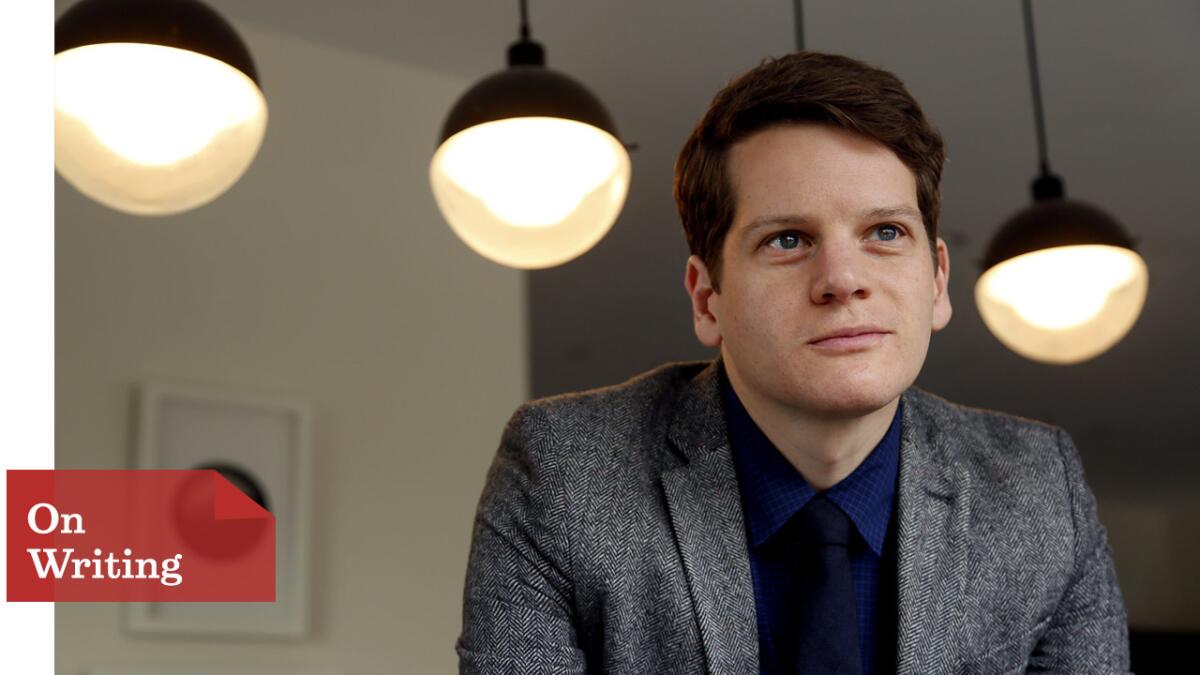Alan Turing’s story the perfect fit for ‘Imitation Game’ scriptwriter

- Share via
In a sense, I’ve been writing “The Imitation Game” since I was 14. Or at least, I’ve spent my whole life since the age of 14 hoping and praying that somebody would let me do it. The craziest part? Somebody actually did.
I first heard the story of Alan Turing when I was a teenager. But here’s the thing about my teenage years, and I’m not going to sugarcoat this: I was not cool. I was not even a little bit cool. I wore an oversize “X-Files” T-shirt to school almost every day. I had a few friends — emphasis on “few,” please — and I loved them, but we were a very motley bunch of outsiders. Some of us were gay, some were straight, but most of us wore nail polish. (I certainly did.) Occasionally, lipstick and eyeliner.
We loved theater and movies, literature and computers. I went to space camp over the summer. I went to a camp one year completely devoted to computer programming. I spent two months in a poetry workshop on the Wellesley campus. This was Chicago in the 1990s, a cultural moment in which the idea that my friends and I would go in drag to school dances, obsessively re-read David Mamet, and still learn to code in C++ — it’s an old computer programming language, don’t even ask — seemed terribly fun, even if to everyone else it was pretty deeply weird.
Anyhow, it was at computer camp that I first heard the story of Alan Turing. But it was more like a legend, passed around the flickering campfire light from programmer to programmer. Did you know that the man who secretly invented the computer was gay? Or that during World War II, he was recruited by MI6 to break Nazi codes? Which he did by building this revolutionary machine, thus winning the war for the Allies? Only, it was all classified afterward? And then, when the government found out he was gay, he was arrested, persecuted by the country he’d just saved from Nazi rule, until he finally committed suicide?
No, I didn’t know any of that. But once I heard the story, I wanted to learn more. I needed to learn everything I could about him. Alan Turing was an outsider’s outsider — perhaps the most brilliant scientist of his generation, a social outcast who produced theories decades ahead of their time. A gay man who was able to keep secrets for the government so well precisely because he’d been forced to spend his entire life keeping his sexuality secret from a world in which a kiss between two men was literally punishable by two years in prison. For a weird kid like myself, who never felt like he belonged or fit in, Alan Turing wasn’t just an inspiration — he was a patron saint.
(As a Jew, my mother would be aghast to hear me describe anyone as a saint, but you get the idea.)
So now we cut ahead a few decades. I became a writer instead of a programmer. I published a mystery novel. I worked for a season on a sitcom. Things were going well, but there was always one story I wanted to tell: The campfire legend that had gotten me through teenager-dom. Somehow, even though Turing’s story had been told beautifully in books and plays, it had never made it to the screen. It was shocking to me — how come no one had ever made a movie about this amazing man?
And that’s when, one night at a party, I met producers Nora Grossman and Ido Ostrowsky. It turned out that they’d just acquired the rights to Turing’s story, and after weeks of pleading, they agreed to let me write a script on spec. They then introduced me to Teddy Schwarzman, who brought the savvy and the resources to make the film. Then, Teddy introduced me to Morten Tyldum, a once-in-a-generation filmmaker who understood the movie I’d always dreamed of making even better than I had. Then, Benedict Cumberbatch, Keira Knightley, the rest of our cast, our passionate crew, and it felt as if our little band of committed weirdos kept growing in size. And we were all there because we were passionate about the same thing: telling Alan Turing’s story.
When I think about our movie, I sometimes like to think that maybe there’s a kid out there somewhere like me. Someone who doesn’t feel like she belongs. Someone who feels different. And that maybe, if we’re all really lucky, she’ll see our movie. And she’ll feel a little bit less alone. And she’ll know that even though she’s not like everyone else, she can still go out and create something amazing.
And then I hope that many years from now, I’ll get to write a movie about her.
More to Read
From the Oscars to the Emmys.
Get the Envelope newsletter for exclusive awards season coverage, behind-the-scenes stories from the Envelope podcast and columnist Glenn Whipp’s must-read analysis.
You may occasionally receive promotional content from the Los Angeles Times.










